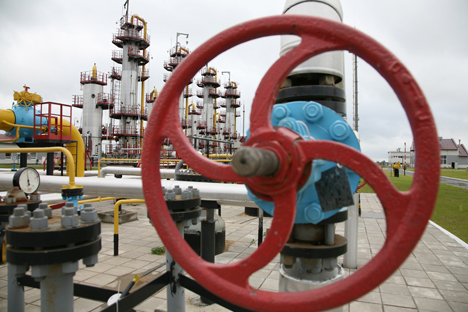
The law could be passed in September and may come into effect in November 2015, with auctions to run from March 2016. Source: ITAR-TASS
Once again, the EU is changing the access scheme to its gas pipelines, which might significantly affect Russian gas exports. The introduction of auctions on the pumping capacities is now on the agenda, to boost competition among gas suppliers.
Russia is effectively suggesting the same scheme, to ensure full access for Gazprom to the OPAL gas pipeline that carries Nord Stream gas. The monopoly faces no competition here, while the auctions applied to the South Stream project might strip Gazprom of some of its capacities.
According to Platts agency, the European Network of Transmission System Operators for Gas (ENTSOG) and the European Commission (EC) are currently working on a bill that will bind EU operators of gas transmission systems to sell the shipment capacities of the pipelines at annual auctions for up to 15 years.
The project is being developed in the framework of the anti-monopoly Third Energy Package and has been approved by the EU. The law could be passed in September and may come into effect in November 2015, with auctions to run from March 2016.
In a comment to Ъ yesterday, the EC said that the document is aimed at more transparent and less discriminatory access to the pipelines. It will also render more transparent the gas trade in the EU, according to the EC.
At the moment, the Third Energy Package obliges the owners and pipeline operators to reserve capacities for several suppliers. However, as the European market players told Ъ, there have been no regulation mechanisms for this norm up to now. Currently, new suppliers receive access on a declarative principle, and the auctions are expected to make the norm market-based.
Russia suggested a similar mechanism to the EU. At the moment, Gazprom is required to open half of the OPAL pipeline capacities (the Nord Stream land bend) to the market. In June, Alexander Novak, head of the Ministry of Energy, said that Russia offers to auction half of the OPAL capacities to the EC, which, in the absence of other candidates, could be granted to Gazprom.
The minister insisted that this option is a compromise that could be acceptable for Europe. Still, there is no final agreement on this, and talks will continue at the end of July.
In mid-July, Anatoly Yanovsky, deputy minister of energy, confirmed to Ъ that Russia “came up with this offer with the EU legislative initiatives in mind.” Previously, Gazprom sources told Ъthat the company agrees to auction OPAL, but the company has recently given no comment.
The Ъ sources explained that EC attempts to limit Gazprom’s access to the OPAL capacities were motivated not only by the need to find other suppliers, but also by the threat of its dominance in the Czech Republic.
According to Mikhail Korchemkin, head of East European Gas Analysis, if the law comes into effect, it will benefit the pipelines’ operators and owners more than from fixed tariffs. Yet the suppliers might run into trouble, says Tatyana Mitrova, head of the oil and gas department at the Energy Research Institute of the Russian Academy of Sciences (ERIRAS).
Gazprom ups 2013 Europe gas export forecast
Gazprom warms Europe, sets new records
If the gas supply contracts are signed for a longer term than shipment contracts, Mitrova asserts that this creates risks. Furthermore, if the gas goes through several countries, there is no guarantee that the supplier will be able to contract the same capacities in each of them for the same time span.
At the same time, the auction scheme applied to the other Gazprom project—the South Stream pipeline—spawns the risk of new suppliers’ entry. If the Third Energy Package norms apply to it, there is a risk that “Azerbaijan gas will come” to the South Stream, says Korchemkin. He believes that the risks of new suppliers’ entry hold for the OPAL as well.
First published in Russian inKommersant
All rights reserved by Rossiyskaya Gazeta.
Subscribe
to our newsletter!
Get the week's best stories straight to your inbox